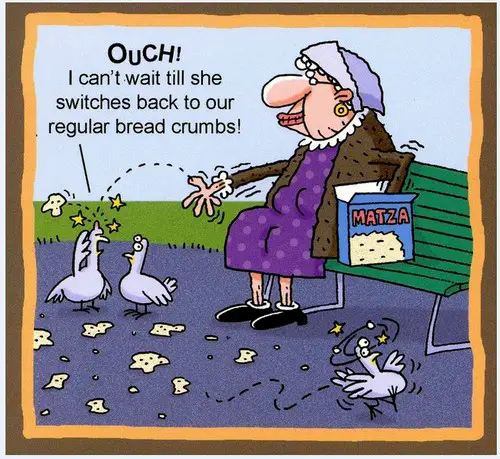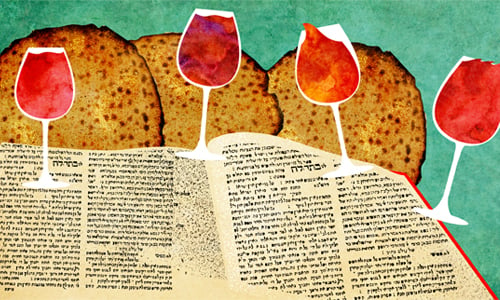Bonjour / Hello [nickname_else_first_name]
This weekend is the beginning of Passover
The Jewish holiday of Passover (in Hebrew, Pesach) commemorates the exodus of the Jews from slavery in Egypt. The holiday originated in the Torah, where the word pesach refers to the ancient Passover sacrifice (known as the Paschal Lamb); it is also said to refer to the idea that God “passed over” (pasach) the houses of the Jews during the 10th plague on the Egyptians, the slaying of the first born. The holiday is ultimately a celebration of freedom, and the story of the exodus from Egypt is a powerful metaphor that is appreciated not only by Jews, but by people of other faiths as well.
PESACH HOLIDAY OVERVIEW / GUIDE
David Azerad has put together a Guide for Passover that can be found at the following links
CLICK HERE FOR ENGLISH VERSION CLIQUEZ ICI POUR VERSION FRANCAISE
ALLAHU ALLAHU (EHAD MI YODEA in phoenetic arabic)
Isaac Darwiche has prepared for the community a phoenetic Arabic version of Allahu Allahu (Ehad Mi yodea)
CLICK HERE TO DOWNLOAD

Table of contents
1) Perashat Hashavoua - Rabbi Eli Mansour
2) Halakhat Hashavoua - Halachot Haggadah - David Azerad
3) Holy Jokes!
1)PERASHAT HASHAVOUA
This Week's Parasha Insight with Rabbi Eli Mansour
Pesah: Remembering the Root Cause of the Egyptian Exile
The Yalkut Reubeni raises a question that sometimes gets overlooked at the Seder, when we celebrate the Exodus of Egypt: why did we need to be slaves in the first place? Why did G-d subject Beneh Yisrael to slavery and oppression before miraculously redeeming them?
The Yalkut Reubeni answers that the Egyptian bondage was a punishment "Midda Ke’negged Midda" ("measure for measure") for the sin of Mechirat Yosef – the sale of Yosef as a slave. Since the brothers sold Yosef as a slave to Egypt, the nation endured slavery in Egypt.
A number of allusions to this cause of the Egyptian slavery can be found in the Seder.
We begin Maggid – the section in which we tell about the Exodus – by pointing to the Masa and announcing, "Ha Lahma Anya Di Achalau Abhatana" – "This is the bread of poverty which our forefathers ate" when they were slaves in Egypt. We then proceed to announce that anyone who is hungry, and in need of a meal, is invited into our homes to join us at the Seder. We recognize that our ancestors ate the "bread of poverty," suffering oppression and deprivation, because of the sin of baseless hatred. Rav Haim Vital (1543-1620) taught that a single Mahloket – fight with a fellow Jew – has the effect of denying a person one hundred opportunities to earn a living. Strife and discord are so destructive that even a single fight can block the path to one hundred sources of income which would otherwise be available. We begin the Seder by acknowledging that our ancestors suffered the "bread of poverty" because of their hatred toward their brother – and we seek to rectify this ill by extending an invitation to all our fellow Jews in need of assistance.
Another allusion is the Karpas – the vegetable that we dip in liquid and then eat after Kiddush at the Seder. Rabbenu Manoah (13th century), in his commentary to the Rambam’s Mishneh Torah (Hilchot Hametz U’masa 8:2), writes that this custom commemorates the dipping of Yosef’s special cloak in goat’s blood. The Torah tells that Yaakob made for Yosef a "Ketonet Pasim" ("striped tunic"), and Rashi explains this term as related to the word "Karpas," which is listed as one of the luxurious materials with which Ahashverosh adorned his palace (Ester 1:6). This special garment aroused the brothers’ jealousy, eventually leading to the great sin of Mechirat Yosef. After Yosef was sold, they dipped the "Ketonet Pasim" in blood to make it appear as though Yosef had been attacked by an animal. We thus dip the Karpas – a symbol of Yosef’s garment – to commemorate the brothers’ hatred which resulted in our ancestors’ bondage in Egypt.
The Midrash relates that on the eve of the Exodus, the firstborns of Egypt mounted a revolt, triggering a bloody civil war. Moshe had accurately predicted nine plagues, and so after he predicted the tenth, the plague of the firstborn, the firstborns sought to save their lives by taking up arms and waging war against their government, which stubbornly refused to allow Beneh Yisrael to leave and thus brought calamity and devastation upon the people. Rav Yehezkel Landau of Prague (1713-1793) explains this incident based on the notion that when Beneh Yisrael rises, their enemies fall, and vice versa. On the eve of the Exodus, Beneh Yisrael rectified the sin of baseless hatred, bonding together with mutual love, respect and harmony. The consequence of their unity was the disunity of their foes, and thus Egyptian society was torn asunder by strife and civil war.
As we celebrate the great miracle of Yesiat Misrayim, let us also be mindful of its cause, and commit ourselves to avoid conflict and strife, to treat our fellow Jews with kindness, warmth and sensitivity despite our differences and our grievances. Just as our ancestors came together in peace and unity at the time of Yesiat Misrayim, so must we join together as we commemorate this event, and so that we may be deemed worthy of our final redemption, speedily and in our days, Amen.
2) HALAKHAT HASHAVOUA
Selected & translated by David Azerad, Hazzan Maghen Abraham
Halachot Haggadah according to the rulings of Rabbi Obadiah Yosef Z”tl
Can a person hear the Haggadah read from another person and consider that as doing the Mitzvah?
Anyone who finds it difficult to read the Haggadah himself, for whatever reason, and wants to hear the reading of the Haggadah from another person and acquit himself from the mitzvah as "שומע כעונה", (listening is like doing the Mitzvah himself) he may do so. The reason for that is because in the Haggadah we have the concept of “שומע כעונה " ,when families gather on the Seder night and the person leading the Seder reads the Haggadah and tells the story of the Exodus from Egypt, by doing so he acquitting everyone from the Mitzvah of “ והגדת לבנך “ and tell your children the story of "יציאת מצרים" )the Exodus from Egypt(. By doing so it is not necessary for everyone to recite the Haggadah to their children since they are all gathered together with other family members and one is reading for all. The above as we said is in the case if someone cannot read the Haggadah for whatever reason. However, in many families the reading of the Haggadah is shared by everyone even though there is one designated person leading the Seder. Everyone can read his part in the language that they are comfortable with. If someone ponders the Haggadah in his heart, and does not utter it with his lips, he is not acquitted from the Mitzvah of reading the Haggadah.
Do women have to read the Haggadah?
Women have the obligation as well as men to read the Haggadah and tell the story of "יציאת מצרים" . Women just like men who can not read for whatever reason are obliged to hear it from others as mentioned above. Women or men who do not understand the Hebrew language in the Haggadah can have it read to them or read it by themselves in the language of their choice. During the reading of the Haggadah one should try to avoid talking and be more attentive and fascinated by the Haggadah and the story of" יציאת מצרים" since this is the Mitzvah pare excellence of the night.
Chag Pesach Kasher Vesameach
Bevirkat Shabbat Shalom Umevorach
David Azerad
3) HOLY JoKeS!!
Selection of funny snippets, loosely related to this weeks parashah, to brighten your day
A British Jew is waiting to be knighted.
He is to kneel before the Queen and recite a sentence in Latin as she taps him on the shoulders with her sword.
However, in the excitement of the moment, he panics and forgets the Latin phrase.
Thinking fast, he recites the only other foreign phrase that comes to mind, which comes from the Passover Seder:
“Ma nishtana ha layla ha zeh mi kol ha laylot.”
Puzzled, the Queen turns to her advisor and whispers, “Why is this knight different from all other knights?”
A Jew owns two pet rabbits and every so often, he’d give them some cardboard to chew on.
On Passover, he decided to give them some matzah to see how they’d like it.
The two rabbits try the matzah. One said to the other, “Does this cardboard taste a bit funny to you?”
The second responds, “Not really. Why is this this cardboard different from all other cardboards?”














